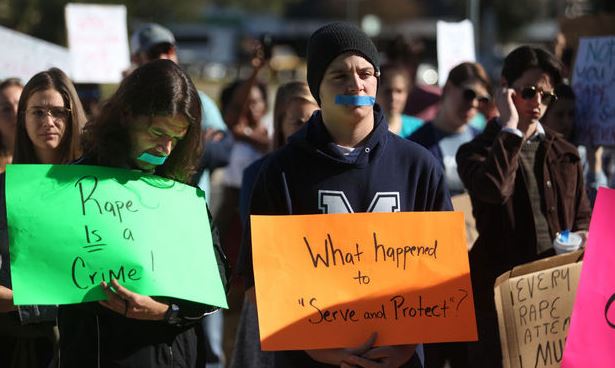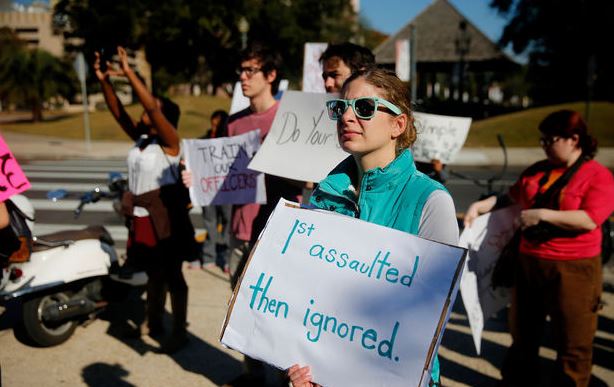
Citizens across the U.S., namely women, are talking about an Indiana law that allows for police officers to be shot. Some women want the law to be passed in states where sexual assaults by police officers on females have a high percentage rate, and they want the law to be extended to outside the home. Women say they are fed up with harassment from police as well as street criminals.
Two professors at Loyola University in New Orleans: Laura Hope and Erin Dupuis, led a march Saturday demanding police and other criminals be held accountable. Although organizers said they do not wish violence on law enforcement, they do want the entire New Orleans Police Department dismantled.
An inquiry by New Orleans Inspector General Ed Quatrevaux’s office, discovered serious problems with special victims units at the NOPD following hundreds of complains from women. Complaints poured in after a woman that was brutally raped and beaten during Mardi Gras, was told by detectives her case would not be investigated.
According to the IG, police and detectives in New Orleans failed to investigate 86 percent of sexual assault crimes against women from 2011 to 2014 — most didn’t even file a formal report. Many of the cases were brutal rapes, or women that had been drugged at a bar and then sexually assaulted. Quatrevaux said the numbers are sickening and police should be ashamed of themselves.

The IG said in some instances in the cases he reviewed, there was DNA evidence. He said those cases were also ignored. He also said they are not just reviewing one or two cases. He said it is so sickening because it is such a large amount of cases.
When detectives were questioned and asked why the cases were not investigated, one of the detectives replied, “Simple rape should not be a crime.” Organizers expressed their concerns with the detective’s statements. “If he does’t think it should be a crime, then maybe his background should be looked into,” they said. Implying that the detective had a history of assaulting women. According to New Orleans officials, the detective was fined and assigned to desk duty.
Professors said the problem is widespread and not just isolated to the New Orleans area. Organizers said, “It’s funny, police will arrest you for marijuana, but turn their heads when a woman is raped or assaulted by one of their own or by a criminal on the street. It’s absolutely disgusting.” They went on to say, “If we didn’t bring this to the surface, it would go unnoticed.”
Hope said that, among other things, the people that marched Saturday wanted an external investigation of how Police Departments handle sexual assault cases. They will not be satisfied with the Police Department itself looking into how the Department is handling rape cases. “With regard to the public trust, to the extent it has been broken, you would think that would be one of the common sense things,” Hope said. “Maybe it’s a conflict of interest and ethically questionable for us to investigate ourselves. Apparently not.”
The Law
The Indiana law that some are speaking about received national attention earlier this year following the slaying of two Las Vegas police officers.
Indiana police officers are upset over the law allowing residents to use deadly force against public servants, including law enforcement officers, who unlawfully enter homes.
The recent incidents in Ferguson and New York has also sparked talk about the law, and hundreds of websites have been formed in support of the law. Officials said even more troubling is the large number of supporters some of the websites have generated.
The law was signed by Republican Governor Mitch Daniels.
The law’s author, Republican state Senator Michael Young, said there have not been any cases [yet] in which people have used the law to justify shooting police.
He said that the term ‘public servant’ was added to clarify the law after a state Supreme Court ruling last year stated, “There is no right to reasonably resist unlawful entry by police officers.” The case was based on a man charged with assaulting an officer during a domestic-violence call.
Young cited a situation of a homeowner returning home to find a police officer raping his daughter. Under the court’s ruling, the homeowner could not touch the officer; he could only file a lawsuit later. Young said he devised the idea for the law after the court ruling.
Young said there have also been instances in which police officers have pulled over females for a traffic stop and sexually assaulted them. He said there is a case currently pending in Orlando, Florida, in which Orlando Police Officer Roderick Johnson sexually assaulted a woman, and then took her to jail afterward. Florida holds one of the top spots for officers sexually assaulting women; however, it is not just Indiana and Florida he said.
In Ohio, an officer actually left a woman for dead after he pulled her over and made sexual advances toward her. She turned him down so he attempted to kill her and make it look like a robbery. He “stomped” on her back, neck, and the back of her head. The officer thought the woman was dead, but she clung to life and was found by a passerby. The officer was eventually convicted after a footprint found on the victim’s back matched his shoes.
“There are bad legislators,” Young said. “There are bad clergy, bad doctors, bad teachers, and it’s these officers that we’re concerned about when they act outside their scope and duty that the individual ought to have a right to protect themselves.”
According to Republican State Representative Jud McMillin, the House sponsor, supporters tried to accommodate police by adding specific requirements that might justify force, and by replacing “law enforcement officer” in the original version with “public servant.”
Governor Mitch Daniels said police corruption has gotten out of hand. He said the state is beginning to see more and more situations in which officers are entering homes unlawfully and threatening homeowners. Homeowners are arrested and charged with resisting arrest when they fight back. “Citizens must be able to protect themselves,” he said.
He said in many cases, officers have entered the wrong houses unannounced — while trying to serve warrants — and shot an unarmed law abiding citizen after they were caught off guard and tried to fight back. In several cases, officers lied and stated they did announce themselves; however, many times, home surveillance footage has proved otherwise.
“The measure requires those using force to ‘reasonably believe’ a law-enforcement officer is acting illegally and that it’s needed to prevent ‘serious bodily injury,’” Daniels said.
Indiana is the first U.S. state to specifically allow force against officers, according to the Association of Prosecuting Attorneys in Washington, which represents prosecutors.
The Association of Prosecuting Attorneys said the Indiana law is actually an amendment to the Castle Doctrine law similar to Florida’s Stand Your Ground law. But it does not extend citizens the right to shoot law enforcement officers approaching their vehicle during a traffic stop, or while eating.
They said the law is intended to allow citizens to protect themselves from corrupt law enforcement officers and detour officers — who are sworn to uphold the law — from breaking the law. “Let’s not pretend like corruption is not happening.”
Although authorities are blaming the Indiana law for recent talks about other states following suit, Indiana lawmakers say they do not have plans to make any changes to the state law at this time.
The Florida Department of Law Enforcement told Ocala Post they do not keep track of statistics involving officers who assault or sexually assault women.
Lawmakers in Florida have not yet been presented with any petitions requesting a bill similar to Indiana’s to be drafted.
New Orleans Mayor Mitch Landrieu and new Police Superintendent Michael Harrison have vowed to do better. However, organizers in New Orleans said they will not stop until the current police force has been revamped.
